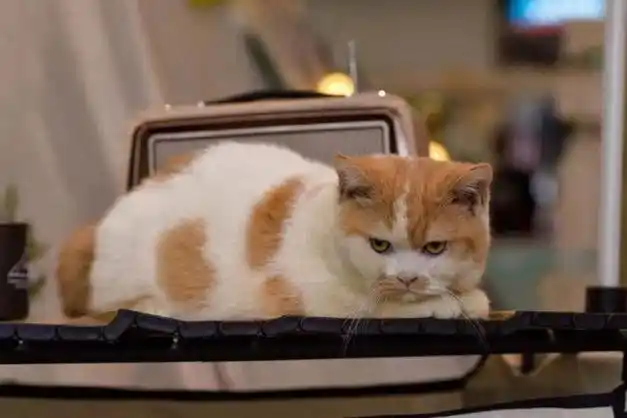As our beloved feline companions age, they often face various health challenges, particularly regarding joint health. Arthritis and other joint-related issues can significantly affect a senior cat’s quality of life. This article will explore effective strategies to help keep your elderly cat’s joints healthy, ensuring they remain active and comfortable in their golden years.

1. Understanding Joint Health in Senior Cats
The Importance of Joint Health
Joint health is crucial for a cat’s mobility and overall well-being. As cats age, their joints can wear down, leading to conditions like osteoarthritis, which can cause pain, stiffness, and reduced activity levels.
Common Joint Issues in Older Cats
Older cats are prone to various joint issues, including:
- Osteoarthritis
- Joint inflammation
- Reduced cartilage health
Understanding these issues can help you take proactive steps in managing your senior cat’s joint health.
2. Recognizing Symptoms of Joint Problems
Signs Your Senior Cat Might Have Joint Issues
Early detection of joint problems is vital for effective management. Common symptoms to look for include:
- Limping or favoring a leg
- Difficulty jumping or climbing
- Decreased activity levels
- Changes in grooming habits
- Weight gain due to reduced mobility
If you notice any of these signs, consult your veterinarian for a thorough evaluation.
3. Nutrition and Joint Health
Choosing the Right Diet for Senior Cats
A balanced diet is crucial for maintaining joint health. Look for high-quality cat food specifically formulated for senior cats, as these diets often contain essential nutrients that support joint health.
Key Nutrients for Joint Support
Consider incorporating the following nutrients into your senior cat’s diet:
- Omega-3 Fatty Acids: Found in fish oil, these fatty acids help reduce inflammation and improve joint lubrication.
- Glucosamine and Chondroitin: These compounds support cartilage health and can help alleviate joint pain.
- Antioxidants: Vitamins E and C can help combat oxidative stress, supporting overall joint health.
4. Maintaining a Healthy Weight
The Impact of Obesity on Joint Health
Excess weight places additional stress on your cat’s joints, exacerbating existing issues and increasing the risk of developing arthritis. Maintaining a healthy weight is vital for joint health.
Strategies for Weight Management
- Portion Control: Measure your cat’s food and avoid free-feeding.
- Regular Exercise: Engage your cat in gentle play to promote weight loss and improve joint function.
5. Regular Exercise and Activity
The Importance of Regular Exercise
Regular exercise helps maintain joint flexibility and muscle strength, which can reduce the risk of joint issues. However, it’s essential to tailor the exercise routine to your senior cat’s abilities.
Safe Exercises for Senior Cats
- Gentle Play: Use toys that encourage your cat to move without excessive strain.
- Interactive Games: Engage your cat in activities that stimulate their mind while promoting movement.
- Short Walks: If your cat is comfortable, consider taking them for short walks outside.
6. Supplements for Joint Health
The Role of Joint Supplements
Supplements can play a significant role in supporting joint health in senior cats. Common supplements include:
- Glucosamine and Chondroitin: Helps support cartilage health and reduce inflammation.
- Omega-3 Fatty Acids: Found in fish oil, these can help decrease joint inflammation and improve mobility.
Consulting with Your Veterinarian
Always consult your veterinarian before introducing any new supplements to ensure they are appropriate for your cat’s specific needs.
7. Creating a Comfortable Living Environment
Modifying Your Home for Joint Health
Making adjustments to your home can significantly benefit a senior cat’s joint health. Consider the following modifications:
- Soft Bedding: Provide comfortable and supportive bedding to reduce pressure on joints.
- Accessible Resources: Ensure food, water, and litter boxes are easily accessible, minimizing the need for jumping or climbing.
- Ramps or Steps: Consider adding ramps or steps to help your cat access higher surfaces without straining.
8. Regular Veterinary Check-Ups
Importance of Routine Veterinary Care
Regular veterinary check-ups are crucial for monitoring your senior cat’s health, including their joint condition. Your veterinarian can provide early detection of issues and recommend appropriate treatment options.
Potential Diagnostic Tests
- X-rays: To assess joint health and detect any abnormalities.
- Blood Tests: To evaluate overall health and identify underlying conditions.
9. Managing Pain and Discomfort
Pain Management Strategies
If your cat is diagnosed with joint issues, effective pain management is essential for improving their quality of life. Options may include:
- Prescription Medications: Your veterinarian may recommend anti-inflammatory or pain relief medications.
- Alternative Therapies: Consider acupuncture or physical therapy, which can help alleviate pain and improve mobility.
Conclusion
Helping your senior cat maintain joint health is essential for their overall well-being and quality of life. By understanding the importance of nutrition, exercise, weight management, and regular veterinary care, you can take proactive steps to support your cat’s joint health. Remember, a healthy and active cat is a happy cat, and your efforts can make a significant difference in their golden years.

Comments (0)